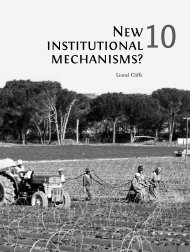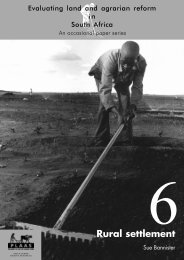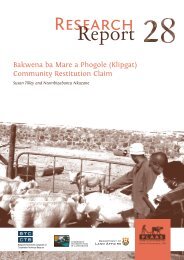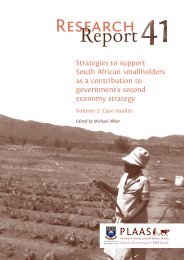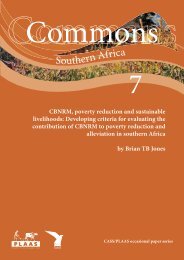Download agenda - PLAAS
Download agenda - PLAAS
Download agenda - PLAAS
You also want an ePaper? Increase the reach of your titles
YUMPU automatically turns print PDFs into web optimized ePapers that Google loves.
SEMINAR INVITATIONSOCIAL PROTESTS, SCARCITY AND VULNERABILITY OF WATERSERVICES DELIVERYDate: 13 September 2013Venue: Stone Cradle Conference Centre, PretoriaThe WRC and UWC (<strong>PLAAS</strong>) invites you to attend a seminar on 13 th September 2013 onSEMINAR ON SOCIAL PROTESTS, SCARCITY AND VULNERABILITY OF WATERSERVICES DELIVERY IN SOUTH AFRICA - growing challenges and concerns. Thepurpose of the seminar is to present and share key trends, new knowledge andresearch outcomes from completed and ongoing studies, as well as generating freshinsights into ways by which to address these challenges. There will be some theorycovered in this seminar, but the main aim will be to convert the principles andtheoretical insights into practical policy that assists Water Service Authorities andNational Government to better deliver on their primary mandate.BACKGROUNDOver the years South Africa has been hit by high volumes of social protests. Protestorsclaim that they protest over lack of service delivery and water is one of the elements ofservice delivery. In 2012 the frequency, geographical spread and violence of servicedelivery-related social protests in post-apartheid South Africa reached unprecedentedlevels. Water service delivery issues rose in prominence among various reasons citedfor protests. While this ascendence is remarkable, grievances over water services arenot new. Water service delivery issues have been (and still are) a part of a range ofconflated grievances that masquerade under the general rubric of ‘service delivery’issues and underpin many rallying calls for social protest action. Although suchconflation reflects the inter-relatedness of social services, it also masks the precisenature of the specific water service delivery issues in question.While protests highlight the prevalence of water services delivery issues in diverse anddynamic local contexts, the crafting of protest narratives and repertoires and thejournalistic reporting of most protest events has often obscured the finer details ofperceived grievance issues and how these transform into protest action. It appears as ifmedia articles on service delivery protests focus on protests that journalists find to benews worthy. The most common limitation, however, is that complex permutations ofmulti-level eruptions, which occur at grass-root level, are often overlooked. These arecommonly social protests which are non-violent and in which only a few peopleparticipate. Moreover, this includes inter and intra household and community levelnegotiation and contestation over water and other basic services. The growing visibilityof water ‘service delivery’ issues has thus not yielded clear understandings of thepolitical, economic, social, institutional, historical and cultural environment within
which social protests tend to occur, the exact nature of grievances over water servicedelivery and how grievance issues permutate into violent protest action.Research findings show that the majority of social protests associated with waterservice delivery tend to occur in working-class urban and peri-urban localitiescharacterised by high levels of poverty, unemployment, inequality, relative deprivation,marginalization and disjunctures (including communication breakdown) betweenwater services development planning at municipal and national levels and water use atlocal household and community levels, irrespective of the political party affiliation oflocal government. Added to this is infrastructure theft, breakdown and obsolescence ofinfrastructure and lack of financial budgets for repairs of existing infrastructure and/ordevelopment of new infrastructure to accommodate burgeoning demands offset byrapid urbanization.The seminar is based on completed and ongoing studies commissioned by the WRC andother organisations, aimed at creating and understanding of how the poor andvulnerable in our country respond to water services/water scarcity and vulnerability,as well as their subsequent reactions. An understanding of these dynamics allows thesector to better improve their policies and processes to respond to emerging challengesand constraints. More importantly, it brings the voices and perceptions from thegrassroots and the ground, for policy makers and managers to take cognisance of.Some of the key aspects that will be covered are: Understanding of social scarcity of water services. Understanding of social vulnerability of water services. Emerging frameworks to assess water services vulnerability and scarcity. Trends in water services protests. Causes of water services protests.RSVP: On or before 30 August 2013.Register by completing the attached registration form and sending it to MrsCharmaine Khanyile at charmainek@wrc.org.zaOr fax: 012 331-2565





